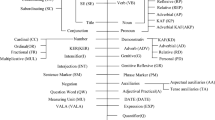Abstract
Reranking modules of conventional parsers make use of either probabilistic weights linked to the production rules or just hand crafted rules to choose the best possible parse. Other proposals make use of the topology of the parse trees and lexical features to reorder the parsing results. In this work, a new reranking approach is presented. There are two main novelties introduced in this paper: firstly, a new discriminative reranking method of parsing results has been applied using Conditional Random Fields (CRFs) for sequence tagging. Secondly, a mixture of syntactic and semantic features, specifically designed for Embodied Conversational Agents (ECAs) interactions, has been used. This approach has been trained with a Corpus of over 4,000 dialogues, obtained from real interactions of real users with an online ECA. Results show that this approach provides a significant improvement over the parsing results of out-of-domain sentences; that is, sentences for which there is no optimal parse among the candidates given by the baseline parse.
Access this chapter
Tax calculation will be finalised at checkout
Purchases are for personal use only
Preview
Unable to display preview. Download preview PDF.
Similar content being viewed by others
References
Lester, J., Branting, K., Mott, B.: Conversational Agents. The Practical Handbook of Internet Computing. Chapman and Hall, Boca Raton (2004)
Robinson, S., Traum, D., Ittycheriah, M., Henderer, J.: What would you ask a Conversational Agent? Observations of Human-Agent Dialogues in a Museum Setting. In: Proceedings of the Sixth International Language Resources and Evaluation (LREC 2008), Marrakech, Morocco (2008)
De Angeli, A., Johnson, G., Coventry, L.: The Unfriendly User: Exploring Social Reactions to Chatterbots. In: Proceedings of International Conference on Affective Human Factor Design, pp. 257–286 (2001)
Schulman, D., Bickmore, T.: Persuading users through counseling dialogue with a conversational agent. In: Proceedings of the 4th International Conference on Persuasive Technology (2009)
Charniak, E., Johnson, M.: Coarse-to-fine n-best parsing and MaxEnt discriminative reranking. ACL (2005)
Riezler, S., King, T.H., Kaplan, R.M., Crouch, R., Maxwell, J.T., Johnson, I.M.: Parsing the wall street journal using a lexical-functional grammar and discriminative estimation techniques. In: Proceedings of the 40th Annual Meeting of the Association for Computational Linguistics (2002)
Collins, M., Koo, T.: Discriminative Reranking for Natural Language Parsing. In: Computational Linguistics, pp. 175–182. Morgan Kaufmann, San Francisco (2003)
Ge, R., Mooney, R.J.: Discriminative Reranking for Semantic Parsing. In: Proceedings of the COLING/ACL-2006 Main Conference Poster Sessions (2006)
Quesada J. F., Amores J. G.: Diseño e implementacin de sistemas de traduccin automtica. In: Universidad de Sevilla, Secretariado de publicaciones (2002)
Amores, J.G., Quesada, J.F.: Episteme. In: Procesamiento del Lenguaje Natural (1997)
Bresnan, J.: The mental representation of grammatical relations. The MIT Press, Cambridge (1982)
Lafferty, J., McCallum, A., Pereira, F.: Conditional Random Fields: Probabilistic Models for Segmenting and Labeling Sequence Data (2001)
Rabiner, L.R.: A tutorial on Hidden Markov Models and selected applications in speech recognition. Proceedings of the IEEE (1989)
McCallum, A.K.: Mallet: A machine learning for language toolkit (2002)
Author information
Authors and Affiliations
Editor information
Editors and Affiliations
Rights and permissions
Copyright information
© 2010 Springer-Verlag Berlin Heidelberg
About this paper
Cite this paper
Acerbi, E., Pérez, G., Stella, F. (2010). Hybrid Syntactic-Semantic Reranking for Parsing Results of ECAs Interactions Using CRFs. In: Loftsson, H., Rögnvaldsson, E., Helgadóttir, S. (eds) Advances in Natural Language Processing. NLP 2010. Lecture Notes in Computer Science(), vol 6233. Springer, Berlin, Heidelberg. https://doi.org/10.1007/978-3-642-14770-8_4
Download citation
DOI: https://doi.org/10.1007/978-3-642-14770-8_4
Publisher Name: Springer, Berlin, Heidelberg
Print ISBN: 978-3-642-14769-2
Online ISBN: 978-3-642-14770-8
eBook Packages: Computer ScienceComputer Science (R0)




